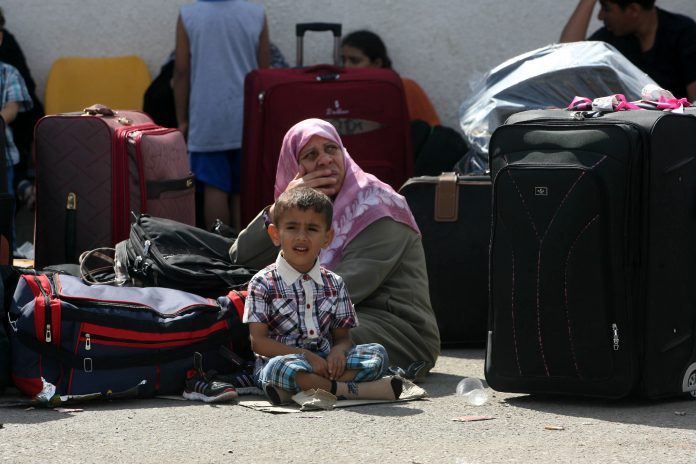(THIS ARTICLE IS MACHINE TRANSLATED by Google from Norwegian)
At first glance, "Muna" looks like any baby in which she rests in her mother's arms, waiting to be weighed by a nurse. If you look more closely, you understand why the medical staff at the Ard El-Insan Children's Clinic in Gaza is concerned. Muna is nine months old, but weighs under five pounds – about the normal weight of a healthy six-week-old baby.
"It's heartbreaking, but normal," says a doctor. "Every day we see more than 50 cases of malnourished children, and the number is increasing."
The situation in Gaza is desperate, especially for the children, and is one of the world's least reported human disasters. The territory is in deep crisis after three wars since 2007, a prolonged Israeli blockade and a budget crisis driven by internal strife and cuts in aid.
Two years ago, the UN described the conditions for the two millions living on the coastal strip as "uninhabitable." Since then, the situation has worsened. The economy is free; it fell by eight percent last year, and the decline continues. Half the population, of which 400 000 children, now live below the poverty line. Unemployment is among the highest in the world, where two-thirds of young people are completely unemployed.
collaps
Basic services are disintegrating at the same rate as the economy. Health services are collapsing, with providers lacking both basic equipment and medicines – including antibiotics. Pure water in the water pipes is just a distant memory. Gaza's poor residents are now queuing up to buy expensive and often unsafe drinking water from trucks. Sewage handling is also a saga: Every day, quantities of sewage are emptied directly into the sea; an amount of the equivalent of 43 Olympic swimming pools. The supply of electricity is sporadic.
Allowing Gaza to end up in a full-scale humanitarian disaster would be irresponsible
disclaimer from the world community.
Children like Muna, and their mothers, feel the crisis on their bodies. Earlier this year, a study was conducted under the auspices of Unicef, Save the Children and the World Food Program to document the nutritional status of women and children in vulnerable areas in the Gaza Strip. The findings were shocking. One in five pregnant women was malnourished. Malnutrition in children is still just below the crisis level, but has increased since 2014. As many as 40 percent of the children in the study had diarrhea or serious respiratory infections – potentially fatal diseases for small bodies that are already weakened by hunger.
Humanitarian aid to Gaza is vital, as half the population does not starve. Four out of five people – 1,6 million in total – need humanitarian aid. But the help is under pressure. Contributors have provided less than half of the $ 351 million needed this year. Major cuts in the budget of the United Nations Relief and Works Agency for Palestinian Refugees in the Middle East (UNRWA) have compounded the problem, putting pressure on an education and health system already stretched to the brink.
Chronic stress
Other aspects of the Gaza tragedy are less visible. Gaza's children are trapped in a mental health crisis, similar to their peers in the occupied Palestinian territories. Half of Palestinian children aged 6-12 years experience emotional and behavioral disorders, according to WHO. Gaza youth suffer scars from traumatic exposure to violence, loss of friends and family, and chronic stress stemming from daily fear and anxiety. A recent study shows that more than two-thirds of children in schools close to the Gaza-Israel fence are suffering from psychosocial unrest. The fragmented health care system is unable to cope with an epidemic of mental health problems of this magnitude.
Israel's blockade is pushing Gaza closer to an acute humanitarian crisis. Restrictions on the flow of goods of medical equipment, drugs and fertilizers have stifled the opportunity to recover from a financial disability; people's livelihoods are undermined, and health centers and clinics are left without essential supplies. Aid organizations complain about delays in deliveries of equipment critical to infrastructure, such as desalination plant equipment.
Tensions between Palestinian West Bank and Hamas authorities in Gaza are contributing to the crisis. In the West Bank, budget transfers to Gaza have been cut, leading to higher unemployment, lower wages and increased pressure on basic services.
Ultimately, Gaza will not experience peace and development without reconciliation and a political agreement that respects and protects both Palestinians and Israelis. Gaza cannot be treated as a separate entity. Gaza is part of the future state that must be established in peaceful coexistence with Israel, all over occupied Palestinian territory.
The prospects for this may seem bleak, but leaving Gaza in a full-scale humanitarian disaster would be an indefensible disclaimer from the international community. Preventing such a disaster requires swift action. Donors must fully fund the UN humanitarian appeal and UNRWA's budget for 2019.
Deal
The nutritional crisis, which has long been neglected, requires a swift response. Later this fall, aid organizations will launch a three-year plan to try to resolve it, with a $ 23 million price tag. Facilitating the blockade will create much needed jobs and help counteract poverty. The World Bank has proposed various ways of easing import restrictions without compromising Israeli security. David Malpass, President of the World Bank, will be able to help negotiate such an agreement.
None of this is easy. The children of Gaza are at the center of an extensive humanitarian storm, and the hope for a whole generation is fading away. If there is a glimmer of hope to be traced, it may be possible to cut through the polarized debate on Gaza and ask a simple question: Does anyone think that children like Muna should be pushed to starvation following a crisis they have not even been involved in create? For the sake of all the children in Gaza, I hope not.
Also read: Gaza is like mercury
Translated by Iril Kolle


